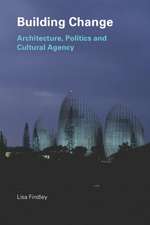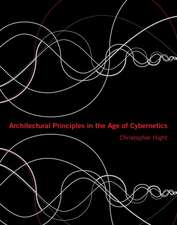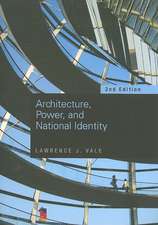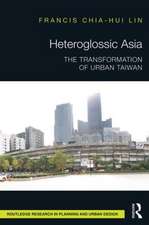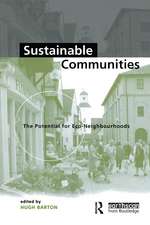Architecture and Capitalism: 1845 to the Present
Editat de Peggy Deameren Limba Engleză Hardback – 29 aug 2013
With new essays by Pier Vittorio Aureli, Ellen Dunham-Jones, Keller Easterling, Lauren Kogod, Robert Hewison, Joanna Merwood-Salisbury, Robin Schuldenfrei, Deborah Gans, Simon Sadler, Nathan Rich, and Micahel Sorkin.
| Toate formatele și edițiile | Preț | Express |
|---|---|---|
| Paperback (1) | 324.24 lei 6-8 săpt. | |
| Taylor & Francis – 6 aug 2013 | 324.24 lei 6-8 săpt. | |
| Hardback (1) | 1015.56 lei 6-8 săpt. | |
| Taylor & Francis – 29 aug 2013 | 1015.56 lei 6-8 săpt. |
Preț: 1015.56 lei
Preț vechi: 1442.41 lei
-30% Nou
Puncte Express: 1523
Preț estimativ în valută:
194.35€ • 202.16$ • 160.45£
194.35€ • 202.16$ • 160.45£
Carte tipărită la comandă
Livrare economică 14-28 aprilie
Preluare comenzi: 021 569.72.76
Specificații
ISBN-13: 9780415534871
ISBN-10: 0415534879
Pagini: 262
Ilustrații: 36 halftones and 5 line drawings
Dimensiuni: 156 x 234 x 18 mm
Greutate: 0.5 kg
Ediția:New.
Editura: Taylor & Francis
Colecția Routledge
Locul publicării:Oxford, United Kingdom
ISBN-10: 0415534879
Pagini: 262
Ilustrații: 36 halftones and 5 line drawings
Dimensiuni: 156 x 234 x 18 mm
Greutate: 0.5 kg
Ediția:New.
Editura: Taylor & Francis
Colecția Routledge
Locul publicării:Oxford, United Kingdom
Public țintă
Postgraduate, Professional, and UndergraduateCuprins
Preface Introduction 1. 1845-1900 Straight Lines or Curved? The Victorian Values of John Ruskin and Henry Cole 2. 1880-1900 The First Chicago School and the Ideology of the Skyscraper 3. 1907-1914 The Display Window as Educator: The German Werkbund and Cultural Economy 4. 1920-1925 Capital Dwelling: Industrial Capitalism, Financial Crisis, and the Bauhaus’s Haus am Horn 5. 1925-1955 Le Corbusier and Capitalism: Big Work 6. 1960-1973 The Varieties of Capitalist Experience 7. 1965-1975 Manfredo Tafuri, Archizoom, Superstudio and the Critique of Architectural Ideology 8. 1970-2000 Irrational Exuberance: Rem Koolhaas and the Nineties 9. 1990-2009 Globally Integrated/Locally Fractured: The Extraordinary Development of Gurgaon, India 10. 2000 Spectacular Failure: The Architecture of Late Capitalism at the Millennium Dome 11. Overview Liberal Afterward Architecture Without Capitalism
Recenzii
"…Peggy Deamer’s new book is a necessary…addition to the global architectural conversation."
--Eva Hagberg, Architectural Record, May 2014
"I am grateful then for Peggy Deamer’s work here in gathering together a number of writers to offer commentary on the relationship between capitalism and architecture and especially so for her structure of the book. Deamer breaks the last two hundred or so years since the publication of Adam Smith’s Wealth of Nations into chapters, each covering a number of decades which the individual authors examine with respect to a dominant geopolitical characteristic of the age in question. If this sounds like heavy weather for post-specification writing relaxation, we are helped into each chapter by Deamer’s clearly and lucidly written forewords that each provide an overview of the age in question and establish both time frame and central thesis." -- Pip Cheshire, Architecture NZ
"This book provides an excellent selection of important historical episodes that comment on the complex relationship between architecture and capital from the 19th century to the near present. There really is not any collection of essays close to this one in its historical scope." -- Rafael Longoria, University of Houston, USA
"In this book, a handful of essays and particularly hundreds of photos by the inevitable Iwan Baan brilliantly portray the history and the daily life of this “Informal Vertical Community”. The compendium stretches this intense case study far beyond Urban-Think Tank’s 2012 exhibition about building, for which they won the Golden Lion at the Venice Biennale. The clash of the formal and the informal, the improvised and the permanent have never come across in a more inspiring way than in this book. If you are considering tucking Rudofsky’s classic Architecture Without Architects under the Christmas tree this year (which is also a good idea!) think of this as a more current version." -- Uncube
"The most promising ambition of the book is to blur the line between architecture and capitalism, to turn the one-way mirror (architecture as superstructure reflecting the economic base, no more) into a two-way looking glass that offers revelations for both architecture and the economy." -- Sara Stevens, Rice University, USA
--Eva Hagberg, Architectural Record, May 2014
"I am grateful then for Peggy Deamer’s work here in gathering together a number of writers to offer commentary on the relationship between capitalism and architecture and especially so for her structure of the book. Deamer breaks the last two hundred or so years since the publication of Adam Smith’s Wealth of Nations into chapters, each covering a number of decades which the individual authors examine with respect to a dominant geopolitical characteristic of the age in question. If this sounds like heavy weather for post-specification writing relaxation, we are helped into each chapter by Deamer’s clearly and lucidly written forewords that each provide an overview of the age in question and establish both time frame and central thesis." -- Pip Cheshire, Architecture NZ
"This book provides an excellent selection of important historical episodes that comment on the complex relationship between architecture and capital from the 19th century to the near present. There really is not any collection of essays close to this one in its historical scope." -- Rafael Longoria, University of Houston, USA
"In this book, a handful of essays and particularly hundreds of photos by the inevitable Iwan Baan brilliantly portray the history and the daily life of this “Informal Vertical Community”. The compendium stretches this intense case study far beyond Urban-Think Tank’s 2012 exhibition about building, for which they won the Golden Lion at the Venice Biennale. The clash of the formal and the informal, the improvised and the permanent have never come across in a more inspiring way than in this book. If you are considering tucking Rudofsky’s classic Architecture Without Architects under the Christmas tree this year (which is also a good idea!) think of this as a more current version." -- Uncube
"The most promising ambition of the book is to blur the line between architecture and capitalism, to turn the one-way mirror (architecture as superstructure reflecting the economic base, no more) into a two-way looking glass that offers revelations for both architecture and the economy." -- Sara Stevens, Rice University, USA
Descriere
Architecture and Capitalism tells a story of the relationship between the economy and architectural design. Eleven historians each discuss in brand new essays the time period they know best, looking at cultural and economic issues, which in light of current economic crises you will find have dealt with diverse but surprisingly familiar economic issues.

